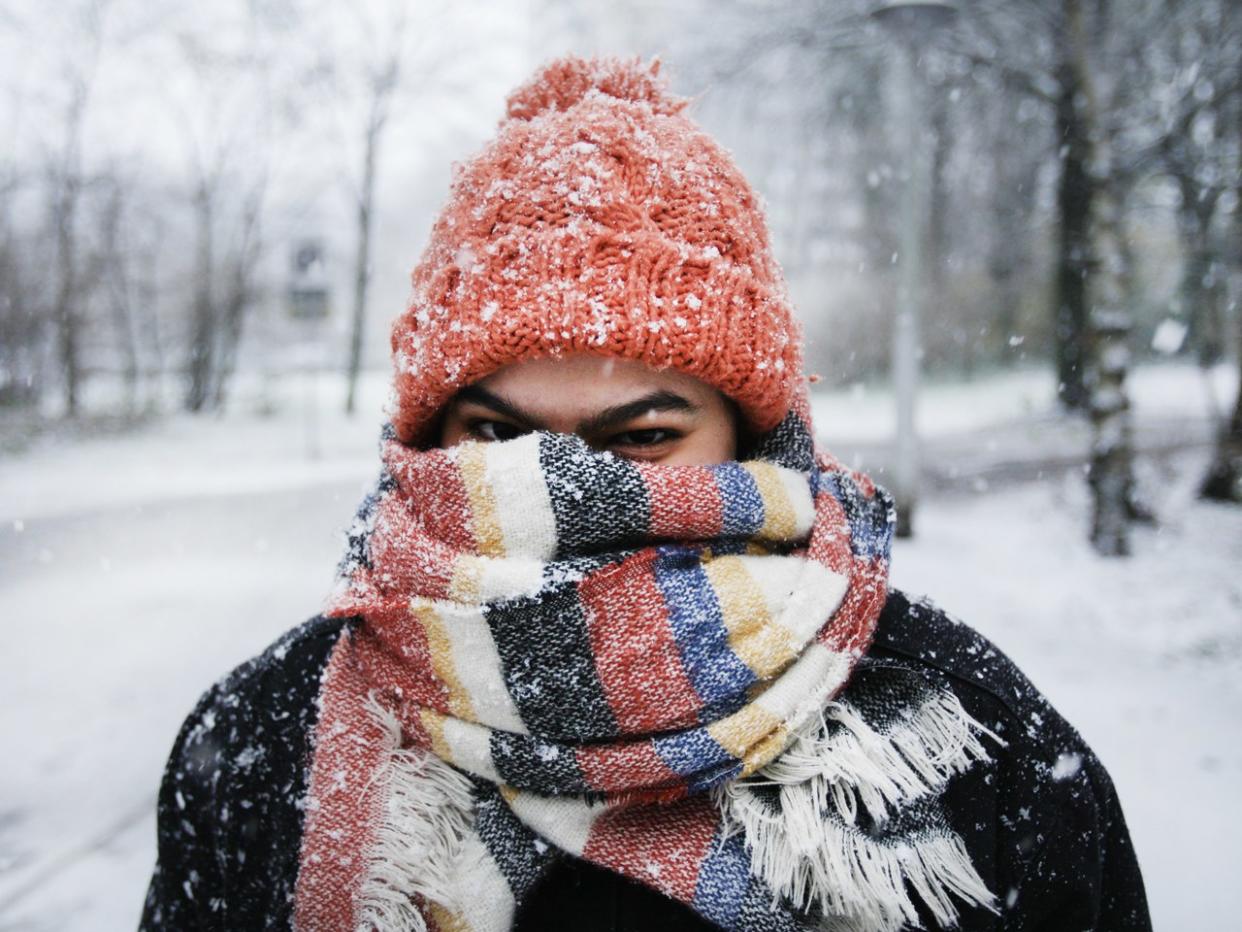Here’s Why It Hurts So Much to Breathe Cold Air

In theory, stepping outside and sucking in a few lungfuls of cold air sounds invigorating. It should energize you enough to climb a mountain, open a salsa jar on the first try, or accomplish some other admirable feat. Instead, it can just feel like you’ve inhaled a lit match. Here’s why this absurd and unfair reality exists, plus what you can do if you’d rather not feel the burn.
The problem with cold air isn’t just that it’s chilly. That jerk is usually dry, too.
It’s all about how cold, dry air interacts with your airways and lungs, Jonathan Parsons, M.D., director of the Division of Pulmonary, Critical Care & Sleep Medicine at The Ohio State University Wexner Medical Center, tells SELF. (Your airways are tubes that carry, well, air between your nose, mouth, and lungs, the National Heart, Lung, and Blood Institute (NHLBI) explains.)
When you breathe in cold air, it can irritate your airways, causing their muscles to constrict, Purvi Parikh, M.D., an allergist/immunologist with Allergy & Asthma Network and NYU Langone Health, tells SELF. This phenomenon is known as a bronchospasm, and it can prompt chest tightness and burning.
There’s also the fact that your lungs are used to working with a certain level of warm, wet air, Dr. Parsons explains. That’s why one of your nose’s many duties is heating and humidifying the air you breathe. If the air is still too cold and dry when it hits your lungs, they might object. With pain. You know, since they can’t talk.
The pain and discomfort can be even worse if you’re dealing with a respiratory health condition.
If you have a health issue like asthma, your airways are already kind of fussy. Asthma makes your airways and the muscles surrounding them liable to overreact when you encounter a substance your respiratory system views as a threat, like pet dander, mold, pollen, dust mites, or…cold air. In that case, gulping a bunch of cold air (or running into some other asthma trigger) can make your airways inflamed and narrow, über-mucous-y, and also make the muscles around them constrict, the NHLBI explains.
Other respiratory conditions like bronchitis (it basically makes the tubes in your lungs become swollen mucus factories) can also cause more trouble when you’re exposed to cold air, according to the American Lung Association.
Try these tips to ease the potential pain from breathing frigid air.
There are a few little lifestyle tweaks you can try to make things easier on your respiratory system, which does a lot for you, so it would be kind of great to return the favor.
For starters, try to always breathe in through your nose, Raymond Casciari, M.D., a pulmonologist at St. Joseph Hospital in Orange, California, tells SELF. It’s better at warming and humidifying the air you breathe than your mouth is.
Another great idea: Cover your nose and mouth with a scarf when it’s cold out, Dr. Parikh says. This helps slightly warm up the air before it hits your nose (or mouth, if you do sometimes breathe through it), making it less likely that freezing air will actually reach your lungs.
If you’re planning to exercise in the cold (go you, seriously), begin slowly. “Allow your body to warm up before you start exercising heavily,” Dr. Casciari says. This gets your body used to the extra intake of cold air bit by bit instead of just shocking the poor thing.
You should be especially careful if physical activity triggers your asthma or if you have a specific form of the condition known as exercise-induced asthma, where you only experience symptoms when working out. Make sure you’re taking your medication as directed, Dr. Parikh says. Whether you rely on a quick-relief inhaler to open up your airways right before you exercise, long-term medication to reduce overall inflammation in your airways, or some combination of both, be sure to follow your doctor’s instructions. (Here’s more information about how to prevent exercise-induced asthma from ruining your workouts.)
Also, just generally pay attention to how much of a tantrum your respiratory system throws in cold air, even if you’re pretty sure you’re in perfect health. If you have a strangely hard time breathing or are dealing with symptoms like an incessant cough, chest tightness or pain, and a whistling sound when you breathe, it could actually be a tip-off that you have a condition like asthma, Dr. Parsons says. It’s possible to develop this health condition as an adult without knowing it, so if winter and your respiratory system seem to be nemeses, don’t hesitate to flag that for your doctor.
Related:

